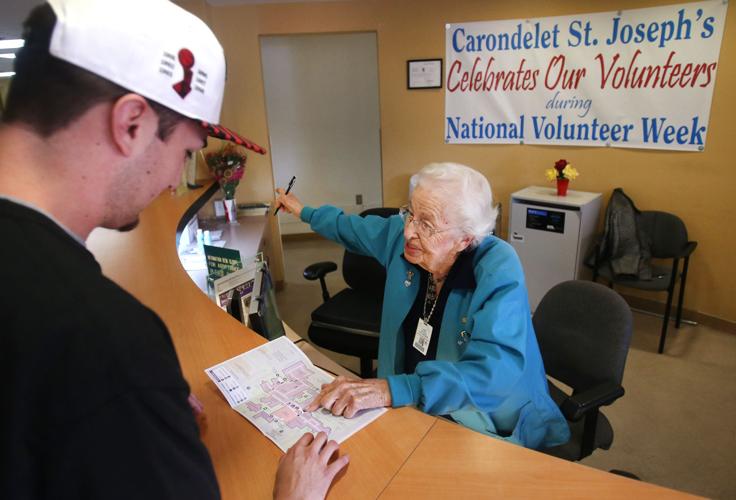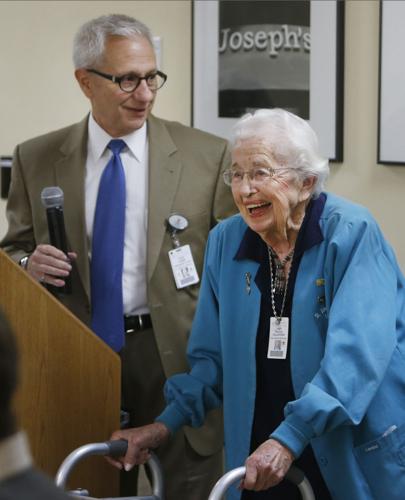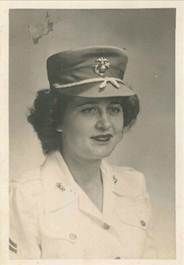A surprise presentation to honor Libby Palicio, a volunteer at Carondelet St. Joseph’s Hospital, hit a snag when the 96-year-old hesitated to leave her post at the information desk.
She wanted to work at the main hospital desk, even during the Wednesday luncheon honoring hospital volunteers. No one was surprised. Palicio has logged 20,000 hours and 38 years of service at the hospital.
“It’s my life,” said Palicio, a former dental assistant. “I have all my friends here. I love it.”
Palicio’s devotion to St. Joseph’s Hospital, 350 N. Wilmot Road, began after the death of her second husband.
The hospital impressed her, and proximity of the deaths of her husband and the dentist she worked for left Palicio looking for ways to keep busy.
This is the first time at St. Joseph’s Hospital a volunteer has clocked so many hours, said Kyle Bennion, the senior director of product management who oversees the volunteer programs at St. Joseph’s and St. Mary’s hospitals.
“When I was first widowed, they would say, ‘Will you come and help?’ and I would say, ‘Yes,’” Palicio said. “I was working maybe five days a week because I was lonesome. Everything was gone.”
Now, Palicio works Mondays and Wednesdays from about 6 a.m. to noon at the hospital’s information desk, though she has volunteered elsewhere.
Twelve hours a week is on the high end for a volunteer, said Lynne Briggs, the president of the volunteer auxiliary board.
“She is not one to sit idle. She is always on the go ...” Briggs said. “She doesn’t sit still any longer than she has to. That’s just a real inspiration.”
At the hospital, she is one of 213 volunteers that gave 37,495 hours in 2014, Briggs said. That is equivalent to about 18 full-time positions. Each year as part of National Volunteer Week, the hospital recognizes its volunteers. This year, the week spans April 12 to April 18.
The hospital’s president and CEO Tony Fonze singled out Palicio for her years of dedication at the Wednesday luncheon, describing his morning stop at the information desk. On the days she volunteers, he expects to see Palicio, and she updates him on the hospital’s daily stats.
“Even before I get to my desk, I pretty much have the picture,” he said during the presentation.
Peggy Cook, a volunteer with 16,500 hours of service, was also honored on Wednesday.
Bettye Amos, Palicio’s niece, drove to Tucson from Kingman with her husband to surprise her aunt.
“Aunt Libby is the backbone of this family,” she said. “She has strength. She has conviction. ... Her direction in the family has always kept this family together.”
Palicio credits her parents and childhood on a Huntsville, Alabama, farm with her can-do attitude.
“My mother was a school teacher, and she was a very strong lady,” Palicio said.
She still lives by the words that her mother taught her: “Never say, ‘I can’t do it.’ Say, ‘I will try.’”
So she has.
She calls herself a “daddy’s girl” who drove tractors and learned to work.
She adds proudly that she still drives. “I drive better than I walk,” she joked.
As a young woman during World War II, Palicio learned that her husband, an officer in the U.S. Marine Corps, had been captured during his deployment to Peking, China.
“His friends said, ‘All of our boys have gone to war, so we have got to have some women,’” Palicio said.
At the time, she was working a government job in Washington, D.C. Her husband’s friends encouraged her to join the Marine Corps and promised to look out for her.
“My husband had made such a sacrifice,” she said. “He gave up everything. He gave up his freedom, so it was the least I could do when the war was on. They needed people.”
Palicio endured boot camp and received training as a dental assistant.
“I was in the barracks, and I think every single day, someone was crying because they lost a loved one,” she said. “They were all in there for the same reason I was.”
After the war’s end and her husband’s safe return home, Palicio was discharged, and the couple later moved to Tucson, where she continued work as a dental assistant.
When asked about defining moments in her life, Palicio answered simply, “Living. I just took every day one day at a time. That’s the way I was trained. I did what had to be done.”







